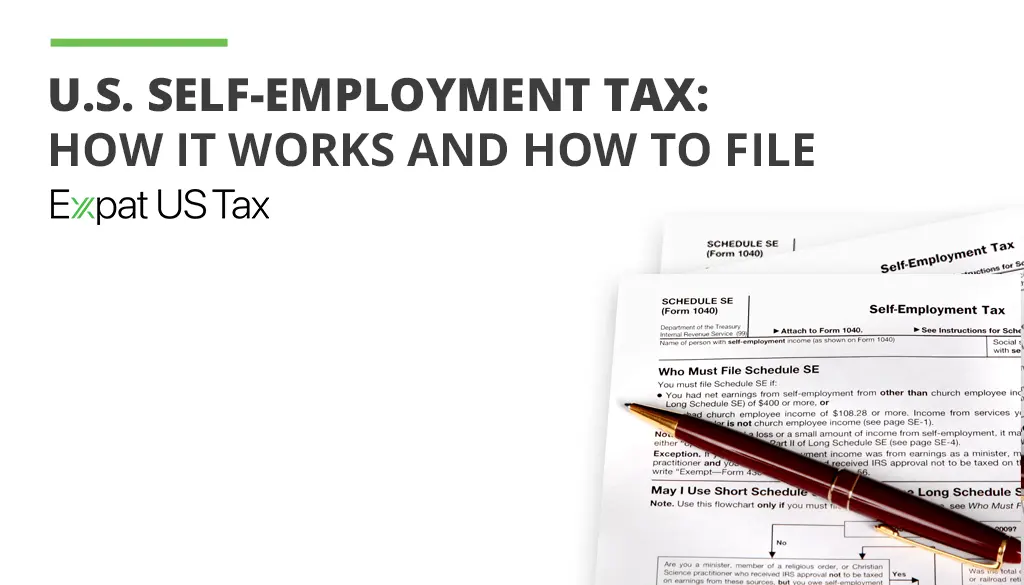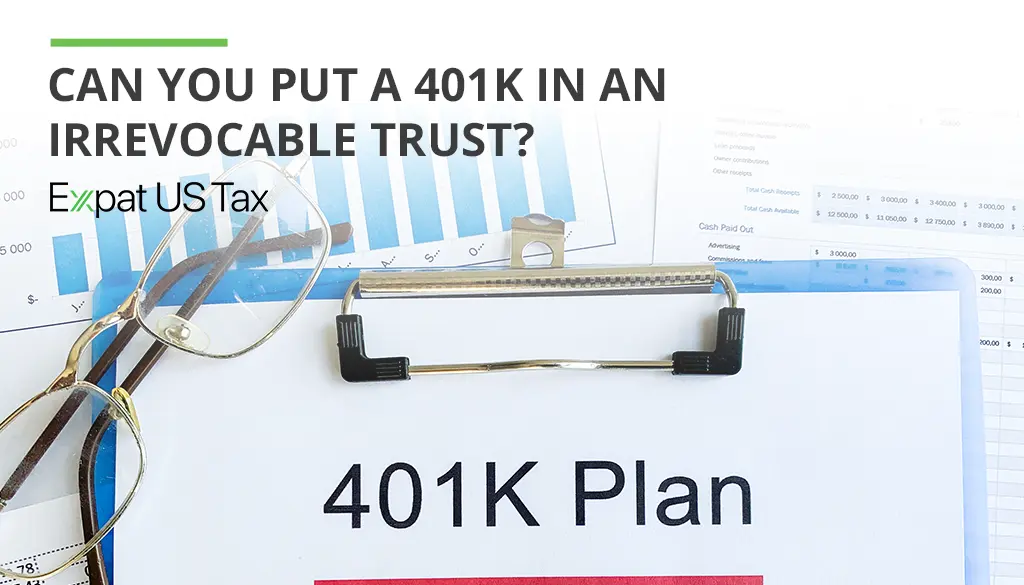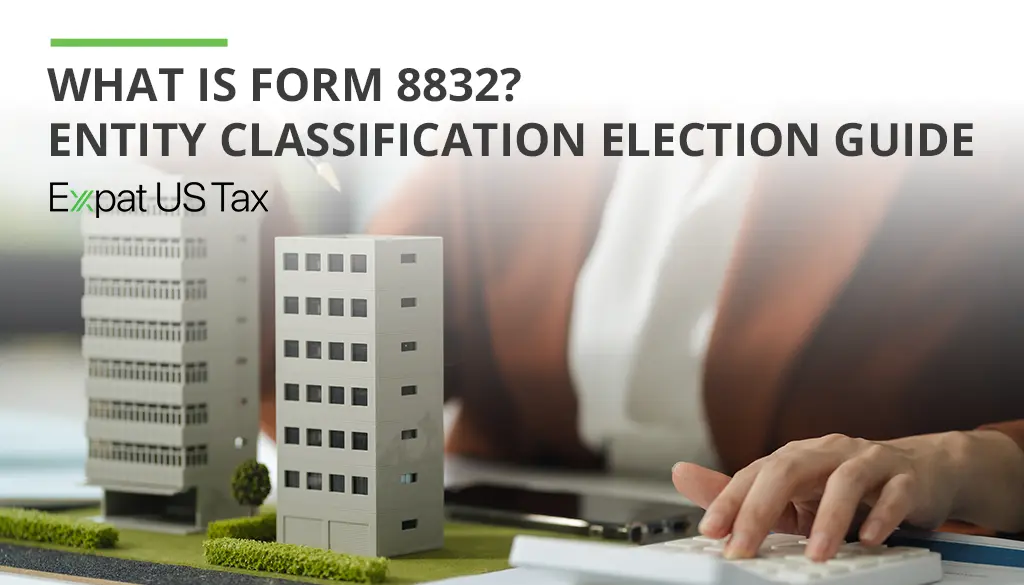US self-employment tax: how it works and how to file


Rose-ann De Villa, an IRS Enrolled Agent and CPA with 15 years of expat tax experience, specializes in US tax preparation, tax planning, and tax advice for US citizens and Green Card holders living and working in the UK.
Rose-ann has been mentioned in the Daily Express UK news wherein she talked about Stimulus payments and Child Tax Credit refunds for US expats in the UK. *Schedule a consultation with Rose-ann today.
*30-minutes US$347.
Table of Contents
What is self‑employment tax for US expats?
Self-employment tax covers Social Security and Medicare contributions for people who work for themselves. The total rate is 15.3%.
That’s 12.4% for Social Security and 2.9% for Medicare.
As a US expat, you’re on the hook if you earn US$400 or more in net self-employment income during the year, even if you live abroad.
If your country has a Totalization Agreement with the US, you may qualify for an exemption, but without such an agreement, the tax fully applies.
How to calculate and report it on Schedule SE
How do you calculate self-employment tax?
Start with your net profit, which is gross business revenue minus costs and allowable expenses. Then, apply the 15.3% rate to 92.35% of that profit, reflecting the IRS’s adjustment.
Step-by-step sample:
Gross income: US$50,000
Costs & expenses: US$10,000
Net profit: US$40,000
92.35% of Net Profit: US$36,940
Self-employment tax (15.3%): about US$5,652
Where do you report it?
Use Schedule SE (attached to your Form 1040) to calculate the exact tax. You’ll also get to deduct half of that tax as an “employer-equivalent” adjustment on your return.
How the Foreign Earned Income Exclusion (FEIE) interacts with Self-Employment Tax
While the FEIE can reduce or eliminate your US income tax, it does nothing for self-employment tax. That’s because self-employment tax is tied to Social Security and Medicare, and it’s calculated separately.
So even if you exclude all your foreign earnings under the FEIE, you’re still responsible for paying 15.3% self-employment tax on any net profit over US$400. This catches a lot of expats off guard, especially those freelancing or running small businesses abroad.
When you file, you’ll still need to report your earnings on Schedule SE to calculate and pay self-employment tax, regardless of what you exclude for income tax purposes. The FEIE and foreign housing deduction help with income tax, but they’re not a pass on Social Security and Medicare contributions.

Need help with expat self-employment tax? Connect with our team.
Totalization agreements and avoiding double Social Security tax
If you’re paying into a foreign country’s social security system, you may worry about being double taxed, once by your host country and again by the US. That’s where totalization agreements come in.
These agreements between the US and certain countries are designed to prevent double contributions and coordinate benefits. They allow your contributions to count in either the foreign system or the US system, but not both.
Here’s how it works:
If you’re self-employed in a country with a totalization agreement and already paying into their social system, you can usually avoid paying US self-employment tax. Your foreign contributions will count toward your future social security benefits in that country.
As of 2025, the United States has totalization agreements with the following countries to coordinate social security coverage and avoid double taxation:
- Australia
- Austria
- Belgium
- Brazil
- Canada
- Chile
- Czech Republic
- Denmark
- Finland
- France
- Germany
- Greece
- Hungary
- Iceland
- Ireland
- Italy
- Japan
- Luxembourg
- Netherlands
- Norway
- Poland
- Portugal
- Slovak Republic
- Slovenia
- South Korea
- Spain
- Sweden
- Switzerland
- United Kingdom
- Urugua
Deductions and credits available to reduce your self-employment tax
Deduct half of your self-employment tax
The IRS lets you deduct half of your self-employment tax (7.65%) as an adjustment to income on Form 1040. It doesn’t reduce the self-employment tax itself, but it does lower your taxable income, which can help you owe less in regular income tax.
Claim your business expenses
You can deduct ordinary and necessary expenses to lower your net earnings. This includes things like office supplies, internet and phone bills, software, travel expenses for work, and even a home office if it qualifies. Since self-employment tax is calculated on your net earnings, reducing them through legitimate deductions directly cuts down how much tax you owe.
Don’t forget estimated tax payments
If you expect to owe more than US$1,000 in taxes for the year, you’re supposed to make quarterly estimated tax payments. These installments spread out your tax liability and help you avoid underpayment penalties.
Planning tips for self-employed expats
Emphasize maintaining detailed records of income, location, and expenses
Suggest strategies like quarterly estimated taxes, consulting cross-border CPAs, and choosing optimal business structures (e.g., LLC, S‑Corp, offshore corp)
FAQs
Do US expats have to pay self-employment tax if they live abroad?
Yes. If you earn US$400 or more in net self-employment income, you must pay 15.3% for Social Security and Medicare, even if you live overseas.
Does the Foreign Earned Income Exclusion remove self-employment tax?
How do I avoid paying US self-employment tax while abroad?
What forms do I need to file self-employment tax as an expat?
Do I still owe US self-employment tax if I set up a foreign company?



